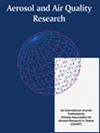洁净室通风与配风系统的系统文献综述
IF 2.5
4区 环境科学与生态学
Q3 ENVIRONMENTAL SCIENCES
引用次数: 3
摘要
洁净室通风系统完善;然而,当前实践的优点和局限性需要进一步研究和解释。本研究首先回顾洁净室通风系统的历史,为理解通风率规格、通风效率中使用的术语和认识通风效率与空气变化率相关的科学研究奠定了基础。该系统评审包括一份综合总结,其中包含一组可用于指定洁净室通风要求的历史数据和证据。科学文章按实验室实验、模拟/数值分析或混合分类。如果正确理解术语,并且设计解决方案易于实施,暖通空调设计师和操作员可以更有效地使用已发布的规范和指南。本研究旨在深入了解通风对洁净室中有害颗粒传输机制的作用。从历史上看,通风率通常被高估,根据设计师的经验,以确保室内空气质量和热性能。但是,过剩率对系统的能耗有很大的影响。因此,必须调查现有的建议,以确保它们是否有科学依据,或者在进一步实施之前是否可以从理论上加以证明。此外,必须评估与传统方法相关的任何可能的风险和影响,以保证设施的性能、可持续性和能源效率。本文章由计算机程序翻译,如有差异,请以英文原文为准。
A Systematic Literature Review of Cleanroom Ventilation and Air Distribution Systems
Cleanroom ventilation systems are well-established; however, the advantages and limitations of current practices need to be examined and explained further. This study begins by looking over the history of cleanroom ventilation systems that creates the basis for understanding ventilation rate specifications, terminologies employed in ventilation effectiveness, and recognizing scientific studies that correlate ventilation effectiveness with air change rates. This systematic review includes a comprehensive summary that contains a set of historical data and evidence that may be used to specify ventilation requirements in cleanrooms. Scientific articles are classified in terms of laboratory experiments, simulations/numerical analysis, or hybrid. HVAC designers and operators can use published codes and guidelines more efficiently if the terminology is properly understood and the design solutions are easy to implement. The present study aims to provide a deep insight into understanding the role of ventilation on the transport mechanisms of unwanted particles in cleanrooms. Historically, the ventilation rate is typically over-estimated, based on the experience of the designer, to ensure indoor air quality and thermal performance. However, the excess rate significantly impacts the system’s energy consumption. Hence, it is crucial to investigate existing recommendations to ensure if they have a scientific basis or could be proven theoretically before further implementations. Besides, any possible risks and influences associated with the traditional methods must be assessed to guarantee the facility’s performance, sustainability, and energy efficiency.
求助全文
通过发布文献求助,成功后即可免费获取论文全文。
去求助
来源期刊

Aerosol and Air Quality Research
ENVIRONMENTAL SCIENCES-
CiteScore
8.30
自引率
10.00%
发文量
163
审稿时长
3 months
期刊介绍:
The international journal of Aerosol and Air Quality Research (AAQR) covers all aspects of aerosol science and technology, atmospheric science and air quality related issues. It encompasses a multi-disciplinary field, including:
- Aerosol, air quality, atmospheric chemistry and global change;
- Air toxics (hazardous air pollutants (HAPs), persistent organic pollutants (POPs)) - Sources, control, transport and fate, human exposure;
- Nanoparticle and nanotechnology;
- Sources, combustion, thermal decomposition, emission, properties, behavior, formation, transport, deposition, measurement and analysis;
- Effects on the environments;
- Air quality and human health;
- Bioaerosols;
- Indoor air quality;
- Energy and air pollution;
- Pollution control technologies;
- Invention and improvement of sampling instruments and technologies;
- Optical/radiative properties and remote sensing;
- Carbon dioxide emission, capture, storage and utilization; novel methods for the reduction of carbon dioxide emission;
- Other topics related to aerosol and air quality.
 求助内容:
求助内容: 应助结果提醒方式:
应助结果提醒方式:


